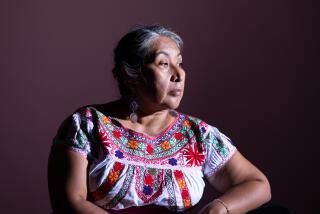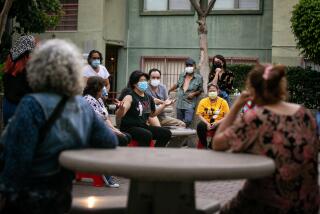Madeline Janis: L.A.’s labor warrior
AN INTERVIEW with Madeline Janis is speckled with paradox — her sunny countenance is shadowed by hints of sadness, her idealism backed by hard, practical politics. She exudes a sort of wistfulness, but with a decidedly steely core.
Janis is a native of the San Fernando Valley who left Los Angeles for college but returned with a zeal for helping immigrants and low-wage workers. A leading architect of the city’s “living wage” law, she sees it as her responsibility to help protect their families, to fight for their right to join a union, to integrate them into a sometimes hostile society. She has watched and aided the rise of labor in modern Los Angeles — a development that is defining the city’s contemporary culture and politics — but she is aggressively mindful that even the ascension of a labor mayor has not ended that struggle.
Janis is a founder of LAANE, the Los Angeles Alliance for a New Economy, which attempts to bring together religious and union leaders on behalf of working people. She also is a lawyer and holds a seat on the city’s Community Redevelopment Agency board, where she uses her influence over planning decisions to lobby for better wages, housing and environmental protection — and, in the view of critics, to stifle development with extraneous social costs.
Janis is optimistic and positive, but do not be deceived: This is a woman with enemies. As a member of the CRA board, she has lobbied for affordable housing set-asides in return for development rights, fought for restrooms for parking attendants in exchange for permission to run parking businesses downtown, and sought “community-impact statements” that require developers to spell out the effects their projects would have on jobs, the environment and traffic. And she has insisted that developers that receive public support for their projects agree to pay city-set wages and benefits.
In the heated L.A. real estate environment of recent years, many developers and others have swallowed hard and accepted those conditions. But some protest bitterly in private and warn that as the market softens, they may opt to take their building projects elsewhere rather than knuckle under to what they see as extortion from Janis and like-minded colleagues.
Janis knows she angers some people, but she is not prone to flinching. “This is what we want,” she said in a recent conversation with The Times. “We want this quality of life for everybody, so every new development is an opportunity to think how we get there.”
Without pressure from groups such as LAANE and a willing, active government, she added, “no one is going to be thinking about poor people or middle-income people or even the right kind of planning we need to build the right quality of life.”
But exerting that pressure on the government is an art as well as a science. Many well-meaning activists make their case to deaf government ears and move along once their issue has passed. Janis, by contrast, has built her influence patiently over many years.
After the riots of 1992 (Janis is the relatively rare person who still calls it “the uprising”) and the mayoral defeat of liberal City Councilman Mike Woo to venture capitalist Republican Richard Riordan in 1993, Janis shifted her focus from immigrant rights to organized labor as the vehicle for her activism. The Los Angeles labor federation in those days was at its own turning point, just beginning the pivot from a Democratic but fundamentally cautious, shop-based movement controlled by construction workers toward a more overtly political organization that gave top priority to lower-wage hotel workers, janitors and others from the service industries.
That suited Janis’ developing politics perfectly, and she soon was swept up in a debate for the soul of local labor. Resistance to turning labor’s emphasis was stiff within many of the unions and from the government as well. Miguel Contreras and Maria Elena Durazo, a husband and wife, each of whom would head the county labor federation, urged their colleagues to adopt a broader political agenda and wore down some of the internal opposition to the new approach.
A testing moment for labor’s strength came in 1995, when Janis led the campaign to persuade the city to adopt a “living wage” law under which contractors who wanted city business would be required to pay higher salaries than mandated by state and federal minimum-wage laws. Riordan opposed the living wage, so labor turned its attention to the City Council.
The debate was long and acrimonious, and Riordan exercised his veto to kill the first proposal. But the council, sympathetic to labor’s arguments and mindful of its exponentially growing power in local elections, overrode Riordan and put the measure in place.
The living-wage battle helped seal labor’s suspicion of Riordan, but Contreras was a canny leader with close ties to Riordan’s most trusted advisor, Bill Wardlaw. When Riordan ran for reelection in 1997, his opponent was Tom Hayden, and Contreras recognized that Hayden had virtually no chance of winning. As a result, Contreras used the election to attempt to bolster labor’s standing by supporting Riordan.
Some leaders were appalled that labor would back a Republican venture capitalist over a Democratic liberal, and the debate over the endorsement pitted labor’s political idealists against its pragmatic forces.
“It nearly destroyed our coalition,” Janis said. “Miguel’s thinking — and Miguel had a certain genius — was: ‘We are so disempowered. And even though this is a Republican mayor and he disagrees with us on all these things, if he’s willing to have a relationship with us, maybe we can get some people appointed, maybe he can help us behind the scenes.’ ”
The federation backed Riordan, and Janis reluctantly acceded. Later, the debate turned to whether the living wage should be required of contractors at Los Angeles International Airport. Despite the fact that the federation had endorsed him, Riordan again opposed it. But this time, the Airport Commission had authority to take up the matter, and Riordan had appointed Contreras to the commission. It was approved.
As Janis relays that story, she smiles a victor’s grin.
With the 2005 election of Antonio Villaraigosa as mayor, labor secured the most intuitively pro-labor mayor in Los Angeles history. Villaraigosa is careful not to appear in the thrall of his labor support — he crossed a picket line last year in order to demonstrate his willingness to buck a union — but he remains clearly sympathetic to the needs of workers in a way that few mayors before him have demonstrated.
In return, he is backed by a thriving labor movement.
“There’s a civic infrastructure that is undergirding a lot of the politics of L.A. today that is really fueled by the leadership of immigrant workers in a few unions and immigrant workers who are organizing,” Janis said, citing truckers at the port, hotel workers, janitors and taxi cab drivers.
Those workers, she added, are pressing not only for improved working conditions but for broader political goals — environmental health, affordable housing and immigration rights, to name just three.
But fighting those fights often puts Janis in the cross hairs. Just recently, she said, local business representatives expressed concern that the CRA board was not appreciating their position on certain issues. They asked for a meeting with members of the board, but refused to attend if Janis was allowed to participate — she is viewed in some quarters as so doggedly opposed to developer interests that some prefer to avoid her.
Janis was miffed, but not entirely dismayed. “I think that it’s good that developers have to think twice about what they have to do when they move through the city process.”
Janis chuckles over the idea that she is feared, but she does not deny that she appreciates the respect it implies.
“I believe that it’s possible to have a better world. I believe that it’s possible to have a better city, and I think that there’s goodness in most people . Some of the greed and selfishness can be put in its place, and we can have a city, at least, and ideally a country, where everybody lives a dignified life.”
Those ideals, she says, keep “me happy and excited even though I make a small salary and struggle with my own family and wish I could pay people here more.” There she pauses, her mouth briefly turned down and her voice lowered. Then Janis picks back up, shifting her eyes back to her interviewer.
“But the pragmatic part, even the cynical part, is that it’s about power. And fundamentally, poor people in this city don’t have power. So if we are going to create a better society, we have to have a big vision, but we also have to be smart and practical about how we achieve it.”
--
jim.newton@latimes.com
More to Read
A cure for the common opinion
Get thought-provoking perspectives with our weekly newsletter.
You may occasionally receive promotional content from the Los Angeles Times.











